Double Trouble: Rare Twin Foals Saved at New Bolton Center
Penn Vet Extra by: Louisa Shepard
Just this one night, after checking each night for two weeks, the exhausted high school teacher did not make the quarter-mile walk to check on her pregnant mare. Of course, this was the night she foaled.
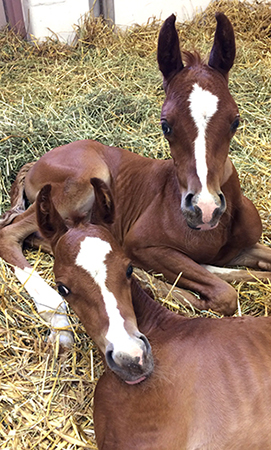 “I went out early in the morning to feed and I knew it as soon as I rounded the corner,” said Jennifer Wilson, owner of the Arabian mare, A-Magic Moment. “She was in the middle of the stall, and she put her head down. I walked up and peeked in, and oh my gosh, there were two!”
“I went out early in the morning to feed and I knew it as soon as I rounded the corner,” said Jennifer Wilson, owner of the Arabian mare, A-Magic Moment. “She was in the middle of the stall, and she put her head down. I walked up and peeked in, and oh my gosh, there were two!”
The mare, called Mona, had delivered twins, a pair of chestnut colts, during the night.
“Are they alive?” she asked herself that June 18 morning. “I saw they were breathing. They were fluffy, like little bears, so it hadn’t just happened. They both popped right up,” she continued. “They had already learned how to stand on their own, and they went over to Mona and started nursing. They were so vital.”
But their vitality quickly deteriorated as diarrhea set in, and worsened. At three days old, unable to nurse, they were on their way to New Bolton Center.
“Best to be Hopeful”
It took twice as long, three hours, from her Delaware farm, through a driving rainstorm, in the old farm truck with broken windshield wipers, for Wilson to make it to New Bolton on that Sunday, June 21. A clinical team was waiting.
“Everybody was very professional, as always,” Wilson said. “I watched them get the foals off the trailer: people wrapped their arms around them, put them in a room, making sure to keep everything super clean and sanitized.”
Seven months pregnant herself, with two young children at home, and her half-Arab mare close to foaling, Wilson had to turn around and head back to her farm.
“I didn’t know if the twins would live, or not live, but I knew they were in the best hands they could be in,” she said. “I did my best to be hopeful.”
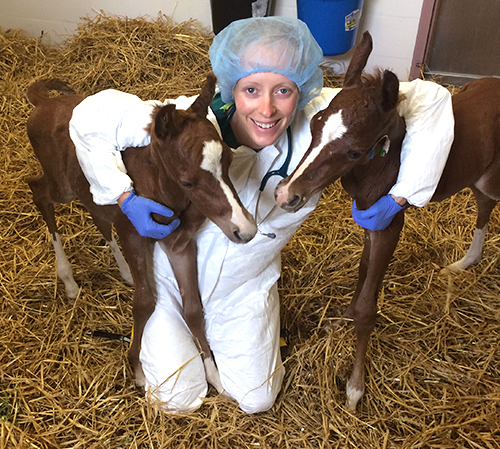 Dr. Michelle Linton, an internal medicine specialist in Emergency and Critical Care, was surprised when the pair came out of the trailer, similar in size and development, which is very rare for twin foals.
Dr. Michelle Linton, an internal medicine specialist in Emergency and Critical Care, was surprised when the pair came out of the trailer, similar in size and development, which is very rare for twin foals.
“I thought, are there really two of them?” she recalled.
Each about 50 pounds, just half the size of a normal newborn foal, there was evidence that they were not fully matured, Linton said. Their legs were weak, and they had laxity in the tendons and ligaments, walking on their fetlocks.
But it was remarkable that they were nearly to term. “The mare did a really good job of maintaining the foals through the pregnancy,” Linton said.
The diarrhea had taken its toll. Their abdomens were noticeably distended, their intestines filled with gas and fluid. They weren’t nursing well, and were suffering from colic.
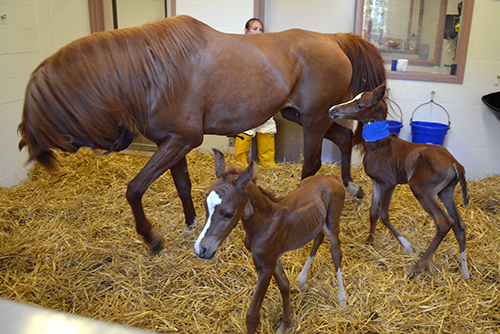
After a full diagnostic workup, the cause became clear: there was evidence of a bacterial infection.
The foals were held off nursing for 12 hours and given intravenous fluids, a dextrose supplement, as well as antibiotics and anti-diarrhea medication, Linton said
The mare and twins were in one stall in the James M. Moran, Jr. Critical Care Center at New Bolton, a biosecure facility designed with a wing for patients with infectious disease, and another wing for those with colic. [Learn more about the unique facility here.] Although they could reach each other, the foals and their mother were separated by dividers to prevent nursing, and to prevent the fluid lines from tangling.
“The next day they were much better, much brighter,” Linton said. The foals were allowed to nurse in increasing amounts every two hours, to make sure they didn’t develop colic.
 “Dr. Linton was great at communicating,” Wilson said. “Every morning and evening she sent me a text or gave me a call, keeping me very up to date, with all of the tests results and how they were responding. And she sent lots of pictures.”
“Dr. Linton was great at communicating,” Wilson said. “Every morning and evening she sent me a text or gave me a call, keeping me very up to date, with all of the tests results and how they were responding. And she sent lots of pictures.”
The foals continued to improve. “Once they returned to full nursing, they never looked back from there,” Linton said. The diarrhea was resolved, and they went home on oral antibiotics on June 29, after eight days in the hospital.
Wilson, in addition to teaching language arts, is a breeder who owns Zenith Farms, on 15 acres in Milford, Delaware. “The homecoming was big,” she said. “They were excited to be outside.”
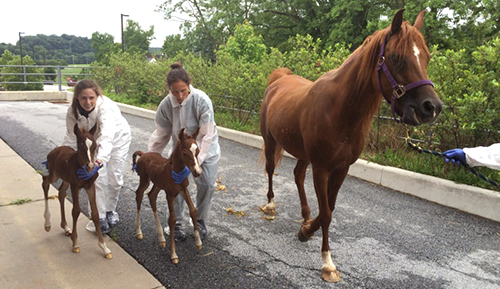 Because of the weakness in the foals’ legs, Linton gave orders for a gradual introduction to exercise. In addition, a farrier trimmed their feet to encourage the proper strengthening and growth in their legs.
Because of the weakness in the foals’ legs, Linton gave orders for a gradual introduction to exercise. In addition, a farrier trimmed their feet to encourage the proper strengthening and growth in their legs.
“Even though they are twins, they have very unique personalities,” Linton said. “I was astounded how the mare handled having the two of them. She was so proud of them – you could tell by her behavior around the foals.”
How did they get the infection? From the mare, or the environment, Linton said, noting that mares can have changes, post-foaling, in their immune system and can shed bacteria, even with no clinical signs.
“A Big Surprise”
Wilson didn’t know Mona was carrying twins.
The mare was bred live cover last year, very late in the summer after several earlier attempts. A sonogram 18 days later showed what appeared to be a single embryo in a single placenta, she said.
In her previous two pregnancies, Mona delivered at about 320 days. Although she looked larger to Wilson and her husband, the small mare – 14 hands, 2 inches – didn’t seem dramatically different in this pregnancy. And she was carrying almost to term, delivering on day 329, just 11 days early.
“It was a big surprise,” she said.
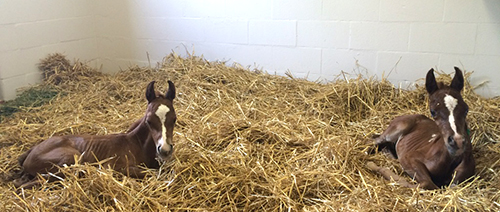 Wilson chose the names Majus and Majician, playing off of the mare’s name of A-Magic Moment, and the sire’s name of Majd Al Rabi. “The wise man and the magician,” she said.
Wilson chose the names Majus and Majician, playing off of the mare’s name of A-Magic Moment, and the sire’s name of Majd Al Rabi. “The wise man and the magician,” she said.
So many people were fascinated by the foals, that Wilson started a Facebook page to chronicle their progress: Majus and Majician-The BOGO Arabian Colts. More than 3,000 people liked the page the first day. The page now has nearly 9,000 likes, and videos of the pair frolicking outside have hundreds of thousands of views.
Beating the Odds
The survival of healthy twin foals is rare. The fact that Mona carried her twin foals nearly to term, and that they each were about the same size, is even more unusual.
Twins historically are the single most important cause of pregnancy loss and abortion in mares, said Dr. Regina Turner, Associate Professor of Reproduction and Behavior at New Bolton Center.
“Twin pregnancies are extremely undesirable in horses, as they almost always have a bad outcome,” Turner said. “If allowed to progress through gestation, twin pregnancies almost always end in late-term abortion of both foals, or the birth of small, growth-retarded foals that either are born dead or severely compromised.”
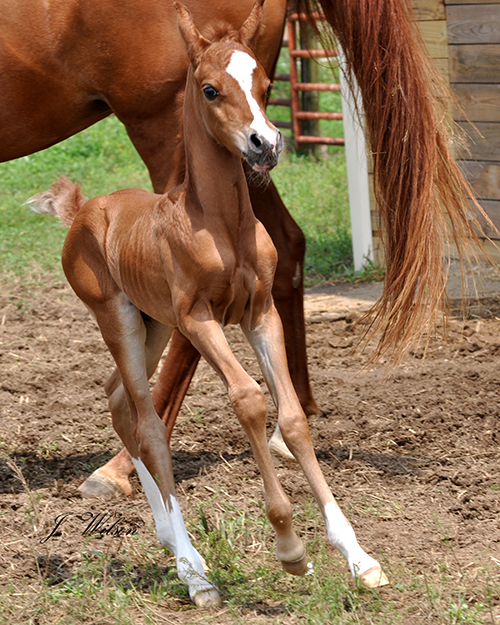
In addition, the birth of twins is more difficult for the mare, which can result in damage to the mare’s reproductive tract, and even result in the mare’s death, she said.
Ultrasound when diagnosing pregnancy has greatly reduced the incidence of twins in horses. “Because of the extremely high risk to both the foals and the mare, twin pregnancies should be reduced to a singleton pregnancy early in gestation,” Turner said.
Almost all twin pregnancies in mares arise from two separate ovulations (dizygotic twins), Turner said. In these cases, the mare ovulates two separate eggs that each are fertilized by the stallion’s sperm.
The rate of double ovulations varies with breed, but is most common in Thoroughbreds, where it can be as high as 15 to 20 percent, Turner said. If a mare has had more than one ovulation on one heat cycle, she is more likely to have multiple ovulations on subsequent cycles. Double ovulations are relatively uncommon in Quarter Horses, Ponies, and Arabians, thus making these twin Arabian foals even more rare.
Wilson thought that perhaps the twin colts were identical, with their nearly matching white blaze and socks. DNA testing shows they are not.
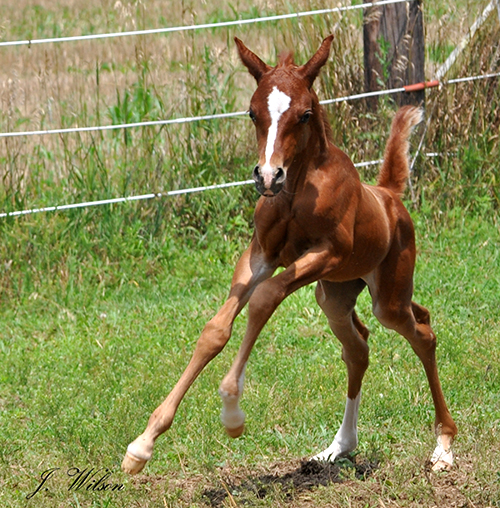 “Identical, monozygotic twins in horses are exceedingly rare,” Turner said, noting that only about three cases have been reported. “Almost all suspected cases of identical twins arise from a double ovulation that goes unnoticed.”
“Identical, monozygotic twins in horses are exceedingly rare,” Turner said, noting that only about three cases have been reported. “Almost all suspected cases of identical twins arise from a double ovulation that goes unnoticed.”
The DNA report on these twins is based on a laboratory test that includes a variety of “marker loci” within the horse genome. These stretches of DNA are known for having very high variability among animals, said Turner, who reviewed the results. If the twins were identical, all of these loci would be exactly the same in both foals.
“But you can see from the report on these twins that, while there are some loci that are the same, there are numerous loci that differ between the two animals,” she said. “This is very consistent with the foals being related and sharing some of the same DNA, but rules out the possibility that the twins are identical.”
Feeling Good
Now that the foals are eating well and developing rapidly, Wilson is looking toward the future.
“I wanted them to hit the five-week mark before I let myself breathe,” Wilson said. “Now I feel good. They are healthy. They are amazing.”
And they are for sale, as is the mare. Wilson has decided to focus the Zenith Farms breeding operation on her two half-Arab mares, rather than purebred Arabians.
“We love Mona, but we had made a decision before the twins were born that we are going to bow out of purebred breeding,” Wilson explained. “The twins are adorable, and I love them. But my heart and soul are in my half-Arab breeding program.”










